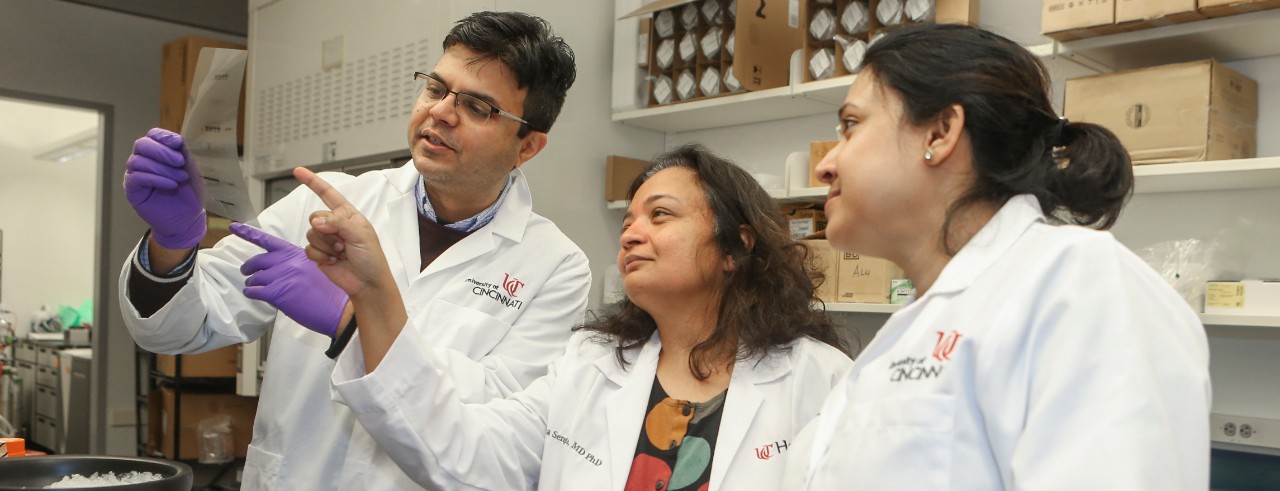
Study reveals potential new treatment for patients with melanoma
A pilot study shows that radiation therapy before immunotherapy may prolong lives of patients
Researchers at the University of Cincinnati, in partnership with Emory University, have uncovered a potentially more beneficial treatment regimen for patients with metastatic melanoma.
The results, published in the International Journal of Radiation Oncology, Biology and Physics, show that radiation before immunotherapy may prolong lives of patients with melanoma that has spread to the brain.
“Melanoma brain metastases occur in more than 50% of melanoma patients,” says corresponding author Dr. Soma Sengupta, associate professor of neurology at UC, UC Health physician and co-director of the UC Gardner Neuroscience Institute’s Brain Tumor Center. She is also the inaugural recipient of the Harold C. Schott Endowed Chair of Molecular Therapeutics.
“While both radiation therapy and ‘immune checkpoint inhibitors,’ a form of immunotherapy, are used alone or in combination for treatment of this cancer, the role of combination therapies and how these treatments could best be sequenced remains unclear,” Sengupta adds.
Immunotherapy is a type of cancer treatment that boosts the body's natural defenses to fight cancer. It uses substances made by the body or in a laboratory to improve or restore immune system function and may work by stopping or slowing the growth of cancer cells. Immune checkpoint inhibitors work by blocking checkpoint proteins from binding with their partner proteins. This prevents the “off” signal from being sent, allowing the T-cells to kill cancer cells.

Dr. Soma Sengupta and Daniel Krummel with members of their lab in the Vontz Center for Molecular Studies. Photo credit: Joe Fuqua / UC Creative Services
In this study, the team conducted a retrospective analysis of patients with surgically removed melanoma brain metastases who underwent treatment with either radiation, immunotherapy or a combination of both between 2010 and 2018. Of 79 specimens, only 17 samples were eligible for this study.
“Among the latter, we specifically investigated the gene expression between patients who received radiation therapy first then immune checkpoint inhibitors in comparison to the reverse,” says Daniel Pomeranz Krummel, research associate professor of neurology at UC and lead author of the paper. “We used a melanoma brain metastases animal model for validation experiments, as well.”
Pomeranz Krummel says results showed that the combination of radiation therapy and immune checkpoint inhibitors correlated to better patient survival when compared to radiation therapy alone.
“Specifically, we found that radiation followed by immunotherapy was superior compared to immunotherapy followed by radiation therapy,” he says, adding that his observation in patients was also observed in the melanoma animal model. “More genetic analysis of the tissue revealed that radiation therapy followed by immunotherapy showed that genes causing cell death signaling, usually fighting the cancer, were restricted and key indicators of inflammation were present.”
“Our study provides initial insights into the optimal sequence of treatment following surgical removal of melanoma brain metastases,” adds Sengupta, noting that this was a small sample of patients and that follow up studies are needed. “Clinical trials examining the best sequence of these treatments are necessary.”
Next Lives Here
The University of Cincinnati is classified as a Research 1 institution by the Carnegie Commission and is ranked in the National Science Foundation's Top-35 public research universities. UC's graduate students and faculty investigate problems and innovate solutions with real-world impact. Next Lives Here.
This research was a collaboration with the Winship Cancer Institute at Emory University. Financial support for this research came, in part, from the National Institutes of Health-National Institute of Neurological Disorders and Stroke (NS083626), the Melanoma Fund, Winship Cancer Institute at Emory University and the Schott Chair for Molecular Therapeutics, University of Cincinnati. Researchers report no conflict of interest.
Related Stories
Before the medals: The science behind training for freezing mountain air
February 19, 2026
From freezing temperatures to thin mountain air, University of Cincinnati exercise physiologist Christopher Kotarsky, PhD, explained how cold and altitude impact Olympic performance in a recent WLWT-TV/Ch. 5 news report.
Discovery Amplified expands research, teaching support across A&S
February 19, 2026
The College of Arts & Sciences is investing in a bold new vision for research, teaching and creative activity through Discovery Amplified. This initiative was launched through the Dean’s Office in August 2024, and is expanding its role as a central hub for scholarly activity and research support within the Arts & Sciences (A&S) community. Designed to serve faculty, students, and staff, the initiative aims to strengthen research productivity, foster collaboration, and enhance teaching innovation. Discovery Amplified was created to help scholars define and pursue academic goals while increasing the reach and impact of A&S research and training programs locally and globally. The unit provides tailored guidance, connects collaborators, and supports strategic partnerships that promote innovation across disciplines.
Blood Cancer Healing Center realizes vision of comprehensive care
February 19, 2026
With the opening of research laboratories and the UC Osher Wellness Suite and Learning Kitchen, the University of Cincinnati Cancer Center’s Blood Cancer Healing Center has brought its full mission to life as a comprehensive blood cancer hub.
